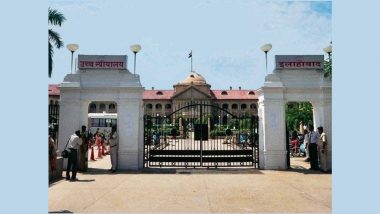Prayagraj, October 12: The Allahabad High Court has observed that a Muslim man, who marries for the second time against the wishes of his first wife, cannot seek a decree from any civil court to compel the first wife to live with him.
The bench comprising Justice Surya Prakash Kesarwani and Justice Rajendra Kumar, made this observation while dealing with an appeal filed by a Muslim man, challenging a family court's order dismissing his case for restitution of conjugal rights. Supreme Court Refuses To Interfere With Bombay High Court Order Granting Bail to Anil Deshmukh in Money Laundering Case.
The bench, while dismissing the plea, said as per the mandate of the Holy Quran, a man can marry up to four women but if he fears that he will not be able to deal with them justly then can marry only one.
"If a Muslim man is not capable of fostering his wife and children, then as per the mandate of the Holy Quran, he cannot marry another woman," the court observed. The court also opined that a Muslim husband has the legal right to take a second wife even while the first marriage subsists.
"But if he does so, and then seeks the assistance of a civil court to compel the first wife to live with him against her wishes, she is entitled to raise the question of whether the court, as a court of equity, ought to compel her to submit to co-habitation with such a husband," the judges said. Supreme Court Says ‘Delay in Sanction To Prosecute Public Servant Wouldn’t Lead to Quashing of Charges’.
The bench also observed that when the appellant has contracted the second marriage suppressing this fact from his first wife, then such conduct of the plaintiff-appellant amounts to cruelty to his first wife.
"Under the circumstances, if the first wife does not wish to live with her husband, then she cannot be compelled to go with him in a suit filed by him for restitution of conjugal rights. If the contention of the husband for grant of decree of conjugal rights is accepted, then from the point of view of the wife, it would amount to breach of her fundamental rights guaranteed under Article 21 of the Constitution of India," it added.
(The above story first appeared on LatestLY on Oct 12, 2022 09:17 AM IST. For more news and updates on politics, world, sports, entertainment and lifestyle, log on to our website latestly.com).













 Quickly
Quickly





















